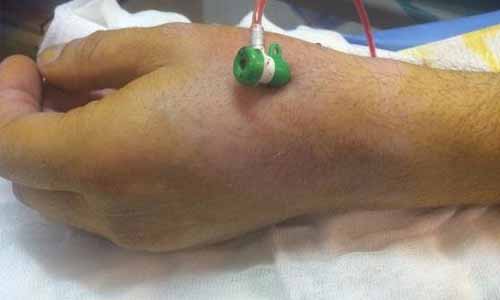- Home
- Editorial
- News
- Practice Guidelines
- Anesthesiology Guidelines
- Cancer Guidelines
- Cardiac Sciences Guidelines
- Critical Care Guidelines
- Dentistry Guidelines
- Dermatology Guidelines
- Diabetes and Endo Guidelines
- Diagnostics Guidelines
- ENT Guidelines
- Featured Practice Guidelines
- Gastroenterology Guidelines
- Geriatrics Guidelines
- Medicine Guidelines
- Nephrology Guidelines
- Neurosciences Guidelines
- Obs and Gynae Guidelines
- Ophthalmology Guidelines
- Orthopaedics Guidelines
- Paediatrics Guidelines
- Psychiatry Guidelines
- Pulmonology Guidelines
- Radiology Guidelines
- Surgery Guidelines
- Urology Guidelines
Radial access has no survival benefit over femoral access in STEMI patients: JAMA

Canada: The use of radical access versus femoral access had no significant survival benefit for patients with STEMI (ST-segment elevation myocardial infarction) referred for primary PCI (percutaneous coronary intervention), according to a recent study in the journal JAMA Cardiology.
According to the study, 30-day mortality occurred in 17 patients (1.5%) assigned to radial access and in 15 patients (1.3%) assigned to femoral access. These findings indicate that adequately trained operators may be able to achieve similar results when using either radial access or femoral access for PCI.
The survival benefit associated with the use of radial access compared with femoral access in STEMI patients referred for PCI remains controversial. Michel Le May, University of Ottawa Heart Institute, Ottawa, Ontario, Canada, and colleagues assessed whether there is a survival benefit when radial access is used instead of femoral access in the STEMI patients referred for primary PCI.
The SAFARI-STEMI randomized clinical trial was conducted at 5 PCI centers in Canada. It enrolled a total of 2292 patients with STEMI referred for primary PCI, between July 2011 and December 2018. They were randomized to receive radial access (n = 1136) or femoral access (n = 1156) for PCI and followed for 30 days.
The mean (SD) age of the patients randomized to radial access was 61.6 (12.3) years and to femoral access was 62.0 (12.1) years
Initially, the primary outcome was bleeding, but this outcome was modified to 30-day all-cause mortality following the recommendation of the granting agency. Secondary outcomes included recurrent myocardial infarction, stroke, and Thrombolysis in Myocardial Infarction–defined major or minor bleeding.
Read Also: For angioplasty in heart attack radial route has less adverse effects : Lancet
Key findings of the study include:
- The trial was stopped early following a futility analysis.
- Primary PCI was performed in 1082 of 1136 patients (95.2%) in the radial access group and 1109 of 1156 patients (95.9%) in the femoral access group.
- Bivalirudin was administered to 1001 patients (88.1%) in the radial access group and to 1068 patients (92.4%) in the femoral access group, whereas glycoprotein IIb/IIIa inhibitors were administered in only 69 patients (6.1%) in the radial access group and 68 patients (5.9%) in the femoral access group.
- A vascular closure device was used in 789 patients (68.3%) in the femoral group.
- The primary outcome, 30-day all-cause mortality, occurred in 17 patients (1.5%) assigned to radial access and in 15 patients (1.3%) assigned to femoral access (relative risk [RR], 1.15).
- There were no significant differences between patients assigned to radial and femoral access in the rates of reinfarction (1.8% vs 1.6%; RR, 1.07), stroke (1.0% vs 0.4%; RR, 2.24), and bleeding (1.4% vs 2.0%; RR, 0.71).
Read Also: Radial-Artery grafts lead to improved outcomes of CABG
"No significant differences were found for survival or other clinical end-points at 30 days after the use of radial access vs femoral access in patients with STEMI referred for primary PCI. However, small absolute differences in end-points cannot be definitively refuted given the premature termination of the trial," concluded the authors.
The study, "Safety and Efficacy of Femoral Access vs Radial Access in ST-Segment Elevation Myocardial InfarctionThe SAFARI-STEMI Randomized Clinical Trial," is published in the journal JAMA Cardiology.

Disclaimer: This site is primarily intended for healthcare professionals. Any content/information on this website does not replace the advice of medical and/or health professionals and should not be construed as medical/diagnostic advice/endorsement or prescription. Use of this site is subject to our terms of use, privacy policy, advertisement policy. © 2020 Minerva Medical Treatment Pvt Ltd